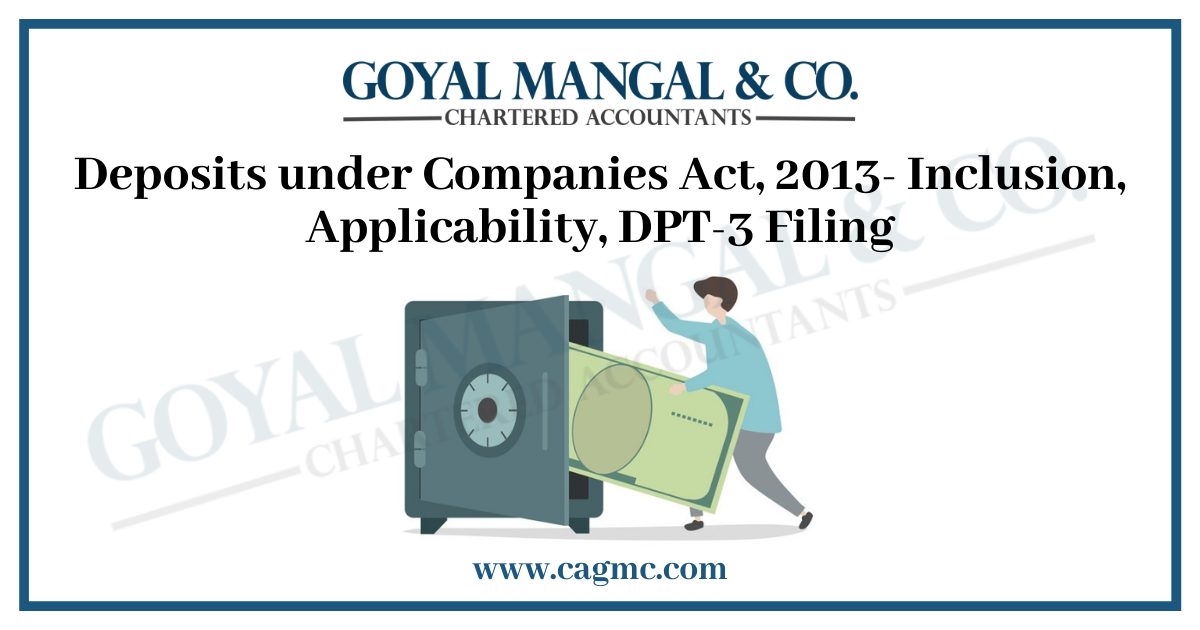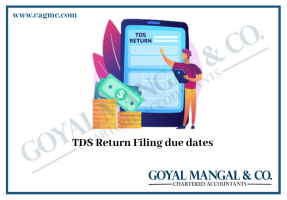
The companies acquire funding through the mode of ‘deposits’. The company’s directors not willing to dilute their stake may choose for deposits from the public at large. The Companies Act, 2013 (Act), Section(s) 73 to 76 read with Rules made under Chapter V of the Act, regulate the invitation and acceptance of deposits.
| Table of contents |
Introduction
According to Section 2(31) of the Act, ‘deposits’ include any receipt of money through deposit or loan or in any other manner, however, it excludes such categories of the amount that is prescribed under Rule 2(c) of the Companies (Acceptance of Deposit) Rules, 2014 (Rules).
The rules provide the following exceptions:
The amount received from:
- The Central or a State Government, or through any such source where the repayment will be guaranteed by the Government;
- Foreign banks or international banks, multilateral financial institutions that are subject to the provisions of Foreign Exchange Management Act, 1999 (FEMA);
- Financial assistance or loan from Public Financial Institutions notified by the Central Government or Scheduled Banks or Insurance Companies;
- A company from any other company;
- An offer made towards the subscription of securities through share application money or advance towards allotment;
- An employee of the company not exceeding his annual salary like non-interest bearing security deposit; etc.
The list is long but we have only mentioned a few exceptions here.
| Deposit | Any receipt of money through deposit or loan or in any other form excluding those transactions that are prescribed under Rule 2(1)(c) of the Companies (Acceptance of Deposits) Rules, 2014 |
| Exempted-Deposit | Any receipt of money as provided under Rule 2(1)(c) of the Companies (Acceptance of Deposits) Rules, 2014 |
Eligible company
Rule 2(1)(e) defines the eligible company as:
“Eligible company” means a public company as referred to u/s 76(1) of the Act, having a net worth of not less than Rs. 100 crores or a turnover of not less than Rs. 500 crores and which has obtained the prior consent of the company in general meeting (GM) through a special resolution and also filed the said resolution with the Registrar of Companies (ROC) and if applicable, with the Reserve Bank of India (RBI) before making any invitation to the Public for acceptance of Deposits;
Provided that an eligible company, which is accepting deposits within the limits specified under clause Section 180(1)(c) of the Act, may accept deposits through an ordinary resolution.
Companies exempted from filing Form DPT-3
The deposits may be accepted by the company from members and the general public according to the provisions of the Companies Act, 2013.
As per Section(s) 73-76 of the Act, it shall not apply to:-
- Banking Company;
- Non-Banking Financial Company according to Reserve Bank of India (RBI) Act, 1934;
- Any other company notified by the Central Government in consultation with the RBI.
Acceptance of Deposits by Private Companies
The Private Ltd. Company cannot accept deposits from the public at large according to the provision of the Act. However, it may accept deposits from its Directors, Members, and relatives of Directors after complying with the conditions as provided under the deposit rules.
The Companies (Acceptance of Deposit) Rules
The rules provide that no company referred to u/s 73(2) of the Act, shall accept or renew any deposit from its members, if the amount of such deposits together with the number of other deposits outstanding as on the date of acceptance or renewal of such deposits exceeds35% of the aggregate of the paid-up share capital, free reserves and securities premium account of the company.
It further provides that the maximum limit regarding the deposits that can be accepted from members that shall not apply to the following classes of private companies, including:-
(i) A start-up for 10 years from the date of its incorporation;
(ii) A Pvt. Limited Co. that fulfills the following:
- Not an associate or a subsidiary company of any other company;
- The borrowing of such a company from banks or financial institutions or anybody corporate is less than twice its paid-up share capital of Rs. 50 crores, whichever is less; and
- Such a company has not defaulted in the repayment of such borrowings subsisting at the time of accepting deposits u/s 73:
Provided also that all the companies accepting deposits shall file the details of monies so accepted to the Registrar of Company (ROC) in Form DPT-3
Filing of DPT-3 Form
A company that may be Small, Big, Private Limited, Public Limited, One Person Company (OPC) to which deposit rules are applicable shall (on or before the 30th June of every year, file with the Registrar of Company (ROC), a return in Form DPT-3 detailing about the deposit.
The Private Companies accepting monies that are not considered as deposits would be required to file “Particulars of the transactions not considered as a deposit” according to the Act and Rules made there under in Form DPT-3.
Punishment for contravention (Rule 21)
A company mentioned u/s 73(2) of the Act or any eligible company that invites deposit or any other person contravening any provision of these rules for which no punishment is mentioned under the Companies Act, the company and its every officer in default shall be liable to be punished with fine extending up to Rs. 5,000 and where the contravention is a continuing one, with a further fine which may extend Rs. 500 for every day after the first day during which the contravention continues.
Final words
The provisions of the Act read along with the Rules have brought several aspects to protect the interest of depositors. As mentioned above, the Rules also provide punishments if there the relevant provisions of the Act are contravened. We have discussed in this article about the inclusions, exclusions, applicability about deposits and DPT-3 Filing. We have also mentioned the companies that can accept deposits and the companies that have restrictions.







